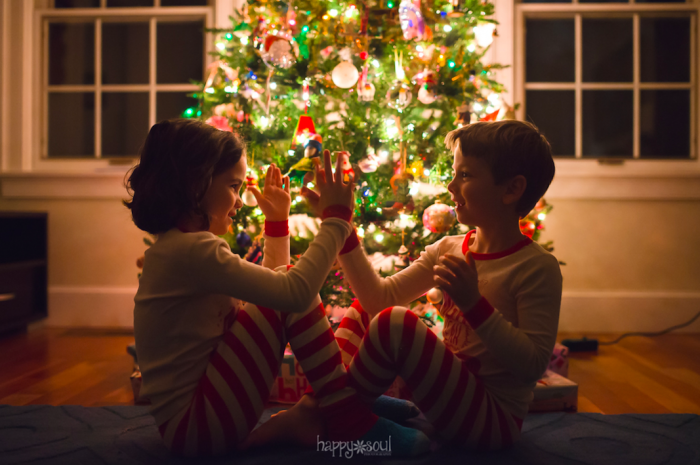Move over, “where do babies come from,” there’s a new winner for striking panic and fear into the hearts of parents everywhere.
“Mom…is Santa real?”
The first time we heard this from my daughter, she was five and happily splashing through bath time. It was December, so though the big guy in red was front and center of her small world, I still wasn’t prepared for the question. I thought we had years before having to face that heart-stopping moment.
I did what any mindful, Christmas-celebrating mama would do in the moment: I paused, breathed, centered, and lied through my teeth.
In first grade, my daughter came home from school, reporting that kids in her class had told her that Santa was fake, that it was really all just parents pretending. I silently cursed those frenemies of hers and doubled down on Santa. We even got an elf that year, as all good lies eventually need corroborating details to shore up the story.
In second grade, she pressed us again, and we responded by upping our Santa game. I downloaded an app that allowed me to put an image of a sneaky Santa into a picture of our living room, digital proof in a digital age of Santa getting caught in the act. We even followed Santa’s Christmas Eve progress online via the NORAD Santa Tracker. How much more official can you get?
“Would the entire world of adults really be in league to create all of these tools to lie about Santa?” I asked my daughter, expertly deploying the “answer a question with a question” technique of true mindfulness.
She looked at me, the doubt in her mind battling with the trust in her heart. Trust won, and we bought ourselves another year.
In third grade, I knew the questions would come again. It would be our fifth holiday season to sidestep, weave, redirect, and ultimately, betray our daughter’s trust in us to perpetuate this fantastical myth. And I was getting tired.
She cornered us in the living room, younger brother tagging along, anguish in her eyes, and pleaded with us for the truth. “Please, I just need to know,” she begged.
For the first time we didn’t lie.
“What do you think?” I asked her. Evasive maneuver, check.
She paused. And then slowly, carefully, said, “I think that everyone believes different things in life. And I believe Santa is real.”
One more year of magic, check.
What should have felt like a win, though, felt flat—a Pyrrhic victory at best. Though we may have won yet another year’s battle in the Santa conquests, were we actually losing the parenting war?
As parents, we strive to create a relationship of openness and trust with our kids; we work toward molding our children into critical thinkers, and we seek to avoid putting our kids into situations where their own ignorance stands in stark, laughable contrast with the common knowledge of their peers.
Wasn’t I deliberately failing at all three of those things?
She came home one day not too long after and told me she’d gotten into an argument with a classmate—a child who’d once again declared Santa wasn’t real—and my daughter, with fire in her eyes and a developing edge of belief-beyond-reason, had hotly defended his existence.
That was the year, the moment, I decided I was all done.
But where was I to go from there? She hadn’t caught me red-handed, the way so many other kids cross that threshold of believing to discovering. I had a unique opportunity to craft the manner in which we pulled back the red curtain to divulge the inner workings of the Santa world.
I knew, with enough planning and prep work, I could guide my daughter through this transition in a mindful, gentle way. She would be surprised, of course, but also delighted to finally know the truth, to be included in this special side of the adult world. Our trust would be bolstered, our relationship strengthened, and I could turn around all those years of my own unease about the lengths that I had gone to in the name of prolonging the magic.
I patted myself on the back for being so mindful. So in tune. So crafty.
I bought a book, The (Wonderful) Truth about Santa by B.K. Gendron and Jessica Jansen. It tells the story of the real St. Nick and how his habit of giving anonymously has inspired parents the world over to give in secret, for the pure joy of giving without expecting recognition in return.
I waited until late summer so that the big reveal could happen in isolation from the emotionally charged context of the holidays.
I practiced my talk about how old and mature she had become, about how she was finally ready to be let in on a very important secret, and how she herself would now get to become a Santa for someone else.
When the day came, I was excited for this bonding moment we were about to share, this threshold we were going to cross together.
We snuggled into our big, cozy reading chair together, and I pulled out the book.
And she grew very, very still.
We started reading together, and as I turned page after page, I kept waiting to feel her snuggle into me more deeply, waiting for that aha moment from her, waiting for her joy at finally being able to see beyond the smoke and mirrors.
Instead, when I looked up, she was crying.
She was crying not like a child who is hurting and needs her mom to comfort and soothe her and make it right. She was holding it all in, still, silent tears sliding slowly down her cheeks.
This wasn’t going the way I had envisioned at all.
I rubbed her back and quickly finished the book, hurrying to get to the part where I congratulate her on being so old, so mature, so ready. I excitedly told her about how lovely it is to give with no strings attached and how fun it would be for her to be a Santa this year, finally, after all those years of wondering how it all works.
She was quiet.
“It’s not all a lie,” I insisted plaintively. “I swear it’s not. Santa is real. I’m Santa and Daddy is Santa and now you get to be Santa and isn’t that wonderful?”
She looked at me, tears drying, and simply said, “Okay.”
I didn’t know it was possible to pack so many accusations and feelings of betrayal into two tiny syllables.
I fumbled, looking for a way to salvage this moment, casting about for a connection we could build.
“Do you, uh, have any questions?” I asked hopefully.
She paused a moment and then said, “So, I’m guessing that the Tooth Fairy, the Easter Bunny, all of them aren’t real, huh?”
Well sh*t. I had been so focused on this beautiful coming out party for Santa that it never occurred to me that the death of one childhood fantasy would mean the death of them all. I did the most mindful thing I could think of at the moment and just…shrugged.
She gave a curt nod and another stoic, “Okay.” And then she got up and went to her room, and I was left to sit in mine, the remnants of her childhood in shreds around me. It was the first time in my parenting life I fervently wished I could take something back.
Oh gosh, dear reader, I feel like I should apologize. You thought this was going to be a how-to guide for bringing your child gently through the Santa reveal in a conscious and tender and not-at-all-harmful way.
I thought it was going to be that, too. But what I got was tears and a tiny girl’s broken heart. What I got was grief.
And then what I got was a chance to give my daughter space to grieve. What I got was a chance to check on her, to ask her if she needed or wanted to talk about it. And then I got a chance to respect her quiet, “Not yet.”
What I got was a chance to wait for her to be ready. To show her that I would respect her autonomy and her timeline and that I would still be here, arms open and ready, when she was.
Being a mindful mama is about planning for the best and then responding to the real. It’s about staying present when plans derail. It’s about being a constant companion to our children as they learn that life is rarely smooth or idyllic, but that parents, in all our fallibility, are there for them when they’re ready.
We are three months post-reveal now and deep in the heat of the holidays. My second grade son is suspicious. He’s talking about setting up video surveillance and Rube Goldberg traps to prove once and for all, one way or another, whether this whole Santa thing is legit.
And my daughter is always the first to respond with an elaborate, magical explanation about why Santa is real, followed by a discrete wink and smile in my direction.
~












Read 10 comments and reply